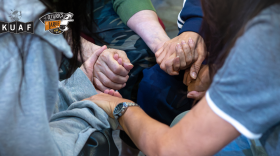Earlier this month, a group of students at the University of Arkansas held their final class in the cozy, sun-drenched honors college lounge at the University of Arkansas. This unusual business course was not looking at how to make money, but ,rather, how to give it away.
On the morning of Dec. 9, the new "strategic philanthropy" class presented to a group of faculty and community partners from local nonprofits and then gave away $50,000 in grant funding.
Daniel Levine and his co-professor Rogelio Garcia-Contreras brought the unique philanthropy course to the university for the first time this semester. Levine explained that his route to philanthropy was a bit surprising.
"Because of my knowledge of classical Greece," he said. “I ended up teaching a course in strategic philanthropy.”
Levine, a classics professor at the University, was approached by the founder of the Once Upon a Time Foundation to accompany him and his family on a trip to Greece in 2021 and then was asked to help him determine what Greek organizations should receive $100,000 in funding.
Levine said he had to do his own research - studying, talking with organizations, and making tough decisions on how and where to deliver that funding. And that process got him thinking.
"I asked if maybe we could bring the philanthropy lab, to the University of Arkansas,” Levine said.
The philanthropy lab is a branch of the Once Upon a Time Foundation and sponsors courses in philanthropy, and since 2012, they have given away over $14 million. That lab is where the grant funding that the students are giving away comes from.
Senior economics student Judy Kamau said this class was intriguing because, like a lot of students, she had experience with nonprofits and volunteer work but had never been engaged in the grant-making side.
"So reading the description of this class, I was like, that sounds really unique,” she said. “And that sounds like a lot of like power for students to be making these kinds of decisions. But I was really interested in learning how to make those decisions and kind of gaining new skills."
And that responsibility is what Levine and Contreras wanted to convey in the class. Halle Hayword, a junior business major, said until this class, she hadn't thought about philanthropy as something you needed to learn.
" I didn't learn about philanthropy necessarily,” she said. “I think this course completely changed that and gave me a basis instead….now I know how big of an impact it is."
The class looked at 12 local organizations as potential recipients and then broke them down into three categories: education, food and trauma. Kamau said the students had to learn how to approach the final decision methodically.
"How well are they like accomplishing their mission statement and vision statement,” she said. “ [we’re] Looking at their financials. How transparent are they? Do things kind of match up with what they're putting out there and what they told us? And then how they assess their impact?”
Philanthropy, as a concept has been around since at least antiquity, Levine said, but as an industry philanthropic giving has been growing. According to a Precision Report study from earlier this month, philanthropic giving is a billion-dollar industry that grew by more than 5% since 2022. And Levine said it is paramount that students get a first-hand look at how that money is dispersed and how to do it responsibly. Part of that was framing how they saw charitable impact.
"On the first day of class, we give each student an envelope with a $10 bill in it and say your assignment for two classes from now is to use this $10 In a philanthropic way that you think will have the most effect,” he said. “They have to make choice for a $10 gift at the beginning. And, and so we had an provoked a discussion of why they chose to do what they did. And they were very honest about about it."
Ben Walworth, a senior marketing student, said getting to that final decision was tough, but the process was the lesson.
"So just trying to be able to take that objective approach to understanding that they all are amazing organizations,” he said. “We really just focused on being intentional with the gift and thinking about the outcomes that we wanted to achieve, and just the impact and being able to maximize that in a strategic way."
In the end, the money was split up into different groups of $750, $2,000 and then the final $30,000. That grand prize went to Seeds that Feed - a local hunger relief organization.
Margaret Thomas is the chief seeder for the organization and said working through this class was more than monetarily rewarding.
“We've worked with a lot of business classes throughout the last 10 years,” she said. “They were empowering and engaging and all of those things that they were talking about today. Yeah, they we have always been kind of forthcoming with our ideas in the classes and we think that their ideas and their perspective is just so important.”
She said they will use the grant to purchase equipment and develop a system for freeze-drying food for the community. Levine says they plan to continue the class in fall of 2024 and believe this class is good for the students and for the community.








